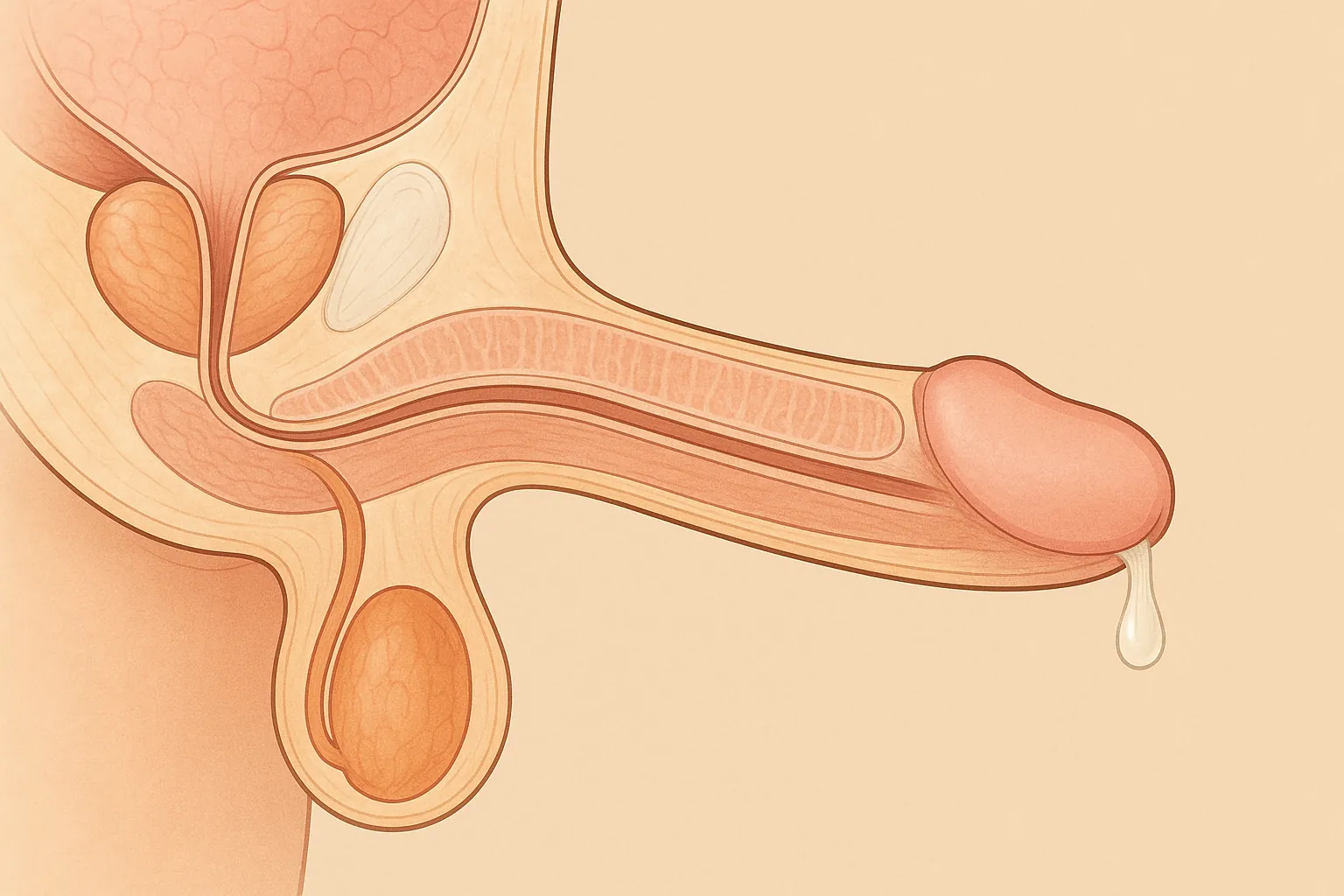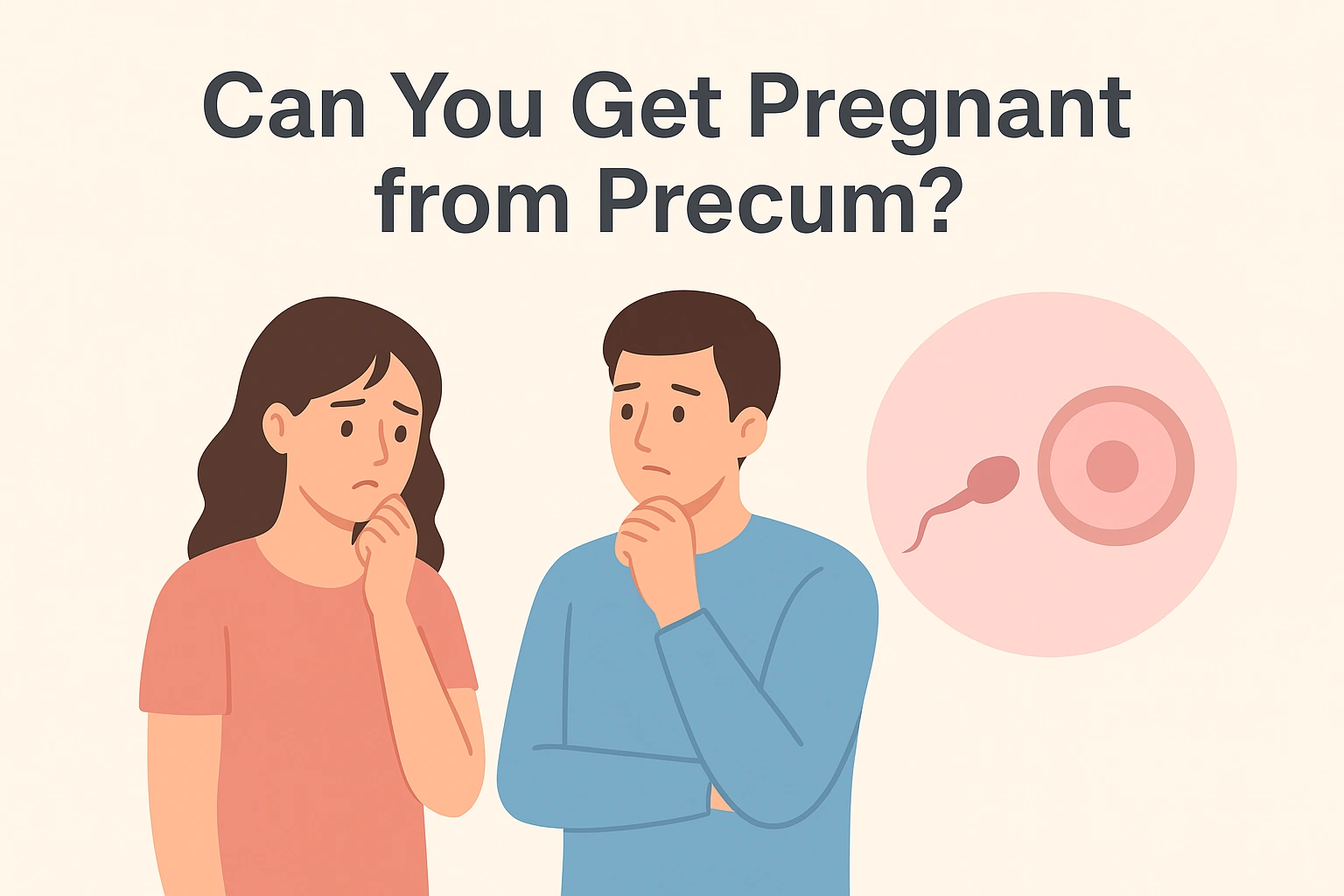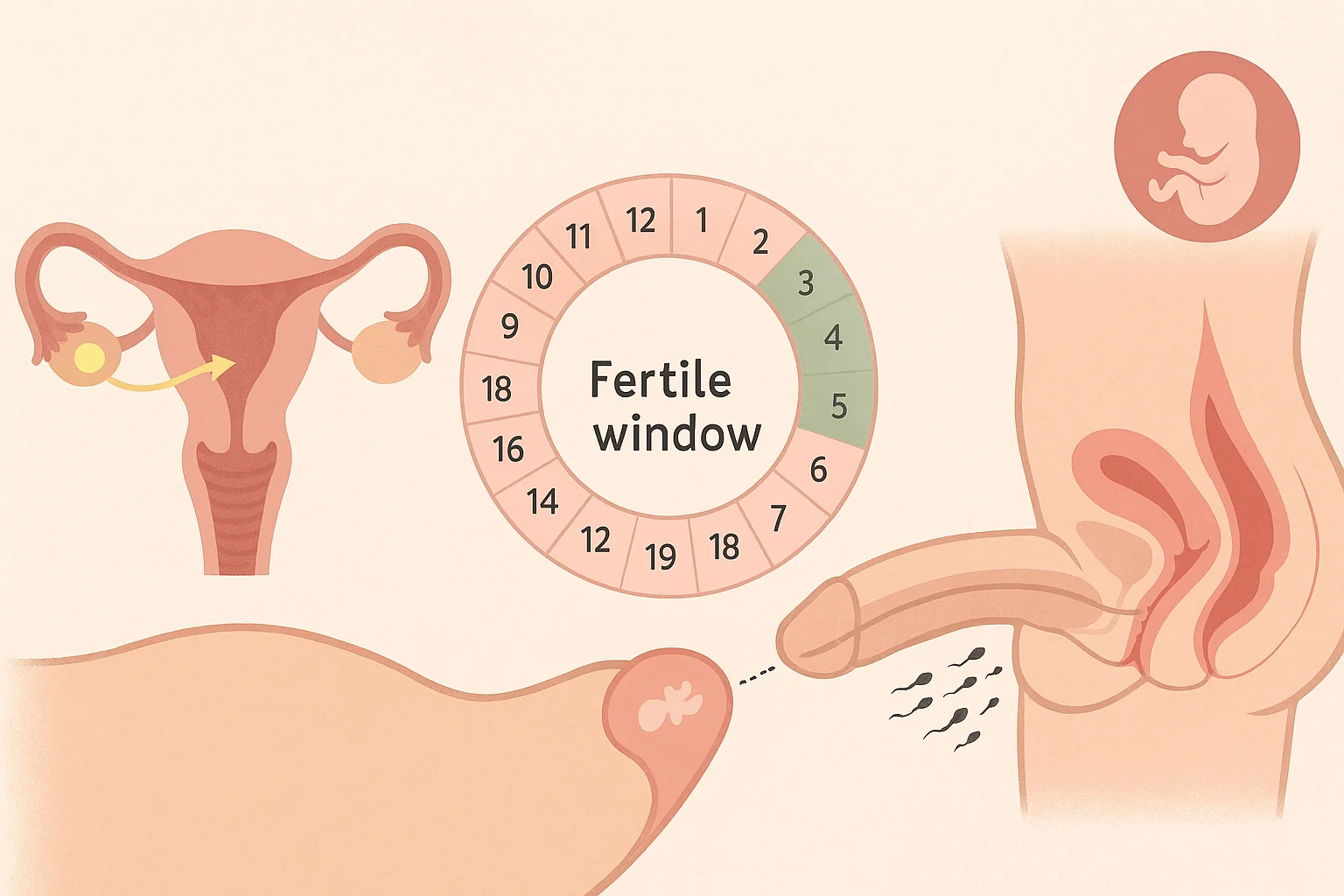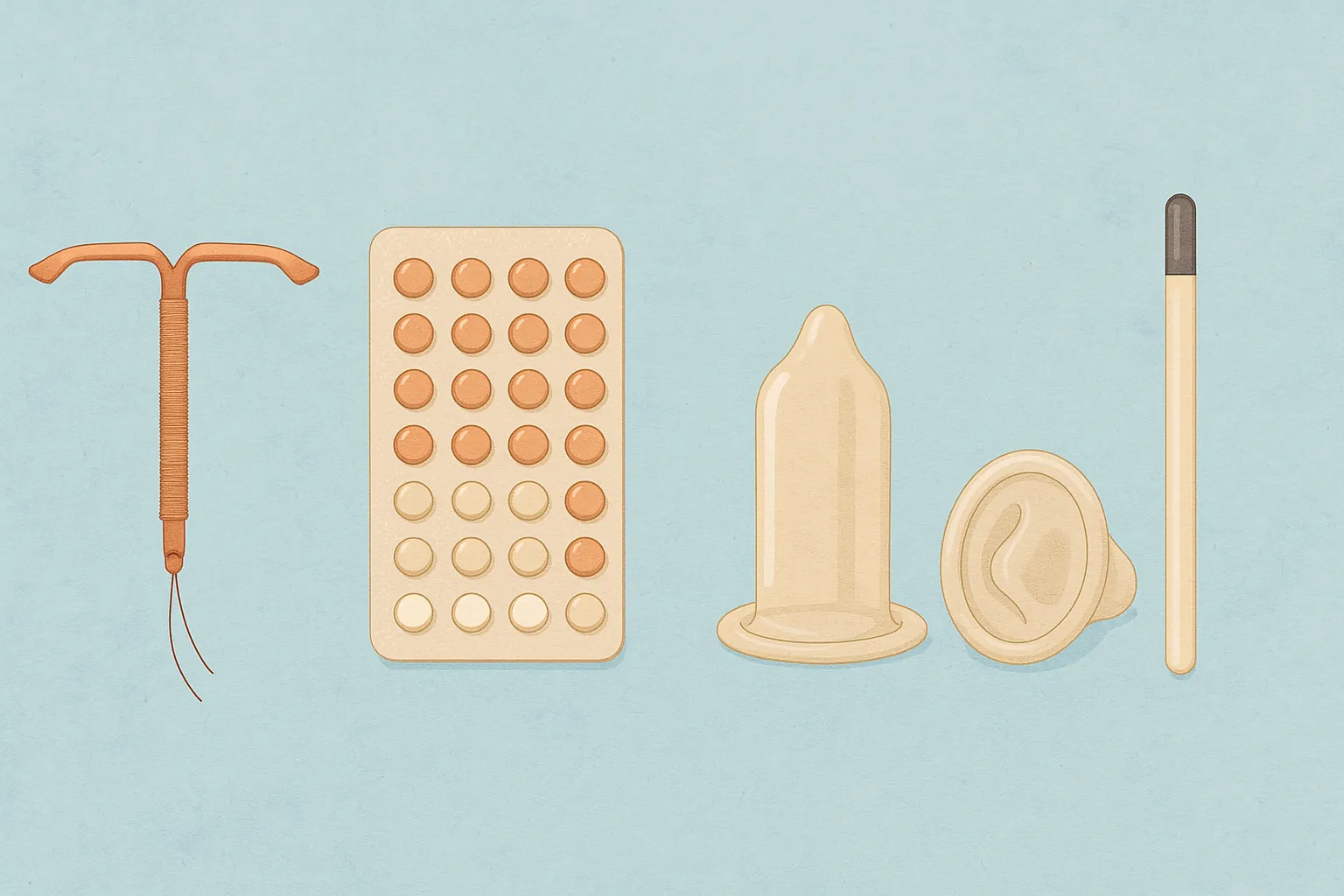Let’s be honest — most of us have asked this question at least once: “Can precum lead to pregnancy?” The short answer? Yes, it can — under the right (or wrong) circumstances.
Studies published by the National Institutes of Health (NIH) regarding various contraception methods show that pre-ejaculate fluid can contain active sperm. show that pre-ejaculate fluid can contain active sperm, which means even without full ejaculation, there’s still a real risk.
If you’ve ever relied on the withdrawal method, you’re not alone — about 35% of young adults admit to using it, and many don’t realize how unreliable it actually is.
This guide breaks down what precum really is, how it works, the actual chances of getting pregnant, and what you can do to prevent pregnancy safely. Ready to get the facts without the awkward Googling? Let’s dive in.
What Is Precum and How Does It Work?

Ever noticed a clear fluid that appears before ejaculation occurs? That’s called precum, or pre ejaculate fluid. It comes from the Cowper’s glands (also known as bulbourethral glands) and acts like nature’s lubricant. Its main job is to clean the urethra so sperm can pass safely later.
During puberty, the male body starts to produce sperm, which later mixes with semen during ejaculation.
The science behind pre ejaculate and pre cum
The science behind pre ejaculate is simple but important. During sexual arousal, the Cowper’s glands release pre cum — a clear fluid that helps neutralize acids in the urethra.
When a person becomes sexually aroused, the Cowper’s glands start releasing pre ejaculatory fluid even before full arousal peaks. This allows sperm to survive better when ejaculation happens.
- Studies published in the Journal of the Medical Association of Thailand (J Med Assoc Thai) found that about 40% of healthy males had sperm present in their pre ejaculatory fluid.
- A prospective study from reproductive health journals also confirmed that sperm can be found in pre ejaculatory fluid in a large percentage of cases. According to reports from Ayer Company Publishers, early reproductive studies highlighted how sperm movement in pre ejaculatory fluid can lead to unintended pregnancies.
- That means even if full ejaculation doesn’t happen, pregnancy can still occur.
- “Relying on the withdrawal method is risky,” says the American College of Obstetricians and Gynecologists, noting its failure rate can reach 22% with typical use.
👉 Remember: Even if you avoid pregnancy using the pull-out method, precum can still contain residual sperm, making it an unreliable way to stay safe.
Can You Get Pregnant from Precum?

Chances of Getting Pregnant from Precum
If you’ve ever wondered “Can precum lead to pregnancy?”, the answer is yes, it can. Even though precum (also called pre ejaculate fluid) looks harmless, it may contain living sperm from previous ejaculations.
When this fluid mixes with the pre ejaculatory fluid released during sexual arousal, it can still fertilize an egg if unprotected sex happens during your fertile window. Several factors affect how likely pregnancy is from precum, such as timing, sperm count, and whether ejaculation occurred recently.
When ejaculation occurs vs. when pre ejaculate is released
- Pre ejaculate or pre cum is released early — during sexual arousal, before ejaculation occurs.
- It is produced by the Cowper’s glands (also called bulbourethral glands) and exits the penis to neutralize acid inside the urethra.
- This clear fluid can pick up residual sperm left from previous ejaculations and carry it out.
- When ejaculation happens, sperm content and semen are released in much higher amounts, raising the risk of pregnancy even more.
- Researchers from J Med Assoc Thai found that sperm present in pre ejaculatory fluid was common among healthy males, showing how easily conception can happen.
Can Genital Contact Alone Cause Pregnancy?
Many people assume pregnancy only happens with penetration, but that’s not entirely true. Here’s what you should know:
- Genital contact without a condom can still allow pre ejaculatory fluid containing sperm cells to reach the vagina.
- If this happens near the fertile window, and sperm lives for up to five days, pregnancy is possible.
- Even a rare case of sperm present on skin or in precum can cause fertilization if it enters the vaginal opening.
- Studies suggest that coitus interruptus (the withdrawal method) has a failure rate as high as 22% with normal use.
Timing Matters: Ovulation, Fertile Window, and Risk

When it comes to getting pregnant, timing is everything. Your fertile window is the few days each month when your body is most likely to conceive. Usually, this happens about two weeks before your next period, but every woman’s menstrual cycle is different.
Here’s the simple truth — if unprotected sex or genital contact happens during this fertile time, can precum lead to pregnancy? Yes, it can.
That’s because sperm cells in pre ejaculatory fluid can survive inside the vagina for up to five days. So even if ejaculation occurs before or after ovulation, those living sperm can still find an egg.
According to the World Health Organization, sperm can remain active long enough to cause pregnancy if the timing lines up with ovulation. Even without full ejaculation, residual sperm in pre ejaculate fluid may still be strong enough to fertilize an egg.
Methods to Prevent Pregnancy: What Actually Works

1. Use reliable birth control — not guesswork
Not all birth control methods are the same. Some work better and last longer. Here are your most effective methods:
- Birth Control Pills: These are taken daily and can prevent pregnancy by stopping ovulation. According to the World Health Organization, pills are over 90% effective when used correctly. They’re easy to use but need consistency.
- Copper IUD (Intrauterine Device): This small T-shaped device is placed in the uterus by a healthcare provider. It’s hormone-free and works for up to five years. It prevents sperm from reaching the egg.
- Condoms: They’re simple and protect against both unprotected sex and sexually transmitted infections (STIs). Plus, they block sperm cells completely.
- Hormonal Implants or Patches: These long-term options slowly release hormones to stop ovulation. Perfect if you don’t want to remember pills every day.
Tip: Always talk to your healthcare provider before choosing a birth control method that fits your lifestyle.
2. Use Plan B as Emergency Contraception
Had unprotected sex or worried about pre ejaculate fluid exposure? Plan B (also called emergency contraception) can help.
- It works best within 72 hours after sex.
- It delays ovulation so that sperm present in your body can’t meet the egg.
- You can find it at pharmacies — no prescription needed.
- If your ejaculation occurs during your fertile window, taking emergency contraception quickly can still prevent pregnancy.
“Emergency contraception is not an abortion pill — it’s a second chance to avoid pregnancy,” notes the American College of Obstetricians and Gynecologists.
3. Skip the Pull-Out and Withdrawal Myths
Many believe that the pull out method or withdrawal method can stop pregnancy. In reality, it’s risky.
- Pre ejaculatory fluid (also called precum) can contain living sperm and residual sperm from previous ejaculations.
- Studies by the J Med Assoc Thai show that nearly 40% of healthy males have sperm content in pre ejaculate fluid — even before full ejaculation happens.
- The failure rate of this method is about 22%, meaning it fails 1 in 5 times. Even if a partner removes the penis before ejaculation, sperm in precum can still reach the vagina and cause pregnancy.
If you’re serious about avoiding pregnancy, don’t rely on luck or timing. Use proven, effective methods like birth control pills, condoms, or an intrauterine device.
4. Combine Methods for Best Protection
If you’re serious about avoiding pregnancy, don’t rely on one method alone. Combining two or more birth control methods gives you stronger protection. For example:
- Use condoms with birth control pills to block sperm cells and control ovulation.
- Pair an intrauterine device (IUD) with condoms to prevent unprotected sex risks and STIs.
- Keep Plan B handy as emergency contraception for rare cases when ejaculation occurs unexpectedly.
Pro tip: Talk to your healthcare provider about what combination works best for your body and routine.
5. Track Your Menstrual Cycle and Fertile Window
Timing matters when it comes to preventing pregnancy. Tracking your menstrual cycle helps you know your fertile window — the few days you can get pregnant from precum or pre ejaculatory fluid.
- The fertile window usually lasts up to five days before ovulation.
- Even if ejaculation occurs outside that window, residual sperm may survive and cause pregnancy.
- Use apps or a simple calendar to predict ovulation days.
“Understanding your cycle empowers you to make smarter family-planning choices,” says the American College of Obstetricians and Gynecologists.
Stay informed, stay safe — because knowing your body is the most effective method to prevent pregnancy.
When to See a Healthcare Provider

If you’re ever unsure whether precum could have caused a pregnancy, don’t panic — but don’t ignore it either. It’s smart to see a healthcare provider if you had unprotected sex or notice signs like a missed period or nausea.
A provider can assist you with family planning and :
- Help you understand your fertile window and menstrual cycle.
- Suggest the right birth control method or emergency contraception if needed.
- Explain how pre ejaculatory fluid or residual sperm can lead to pregnancy even when ejaculation occurs outside the body.
Tip: Always be open with your healthcare provider about your situation. They’ve seen it all — there’s no reason to feel embarrassed.
Take a Pregnancy Test After Precum Exposure
If you’re wondering whether can precum lead to pregnancy, taking a pregnancy test is the only way to know for sure.
Here’s what to do:
- Wait up to five days after your fertile window for the most accurate results.
- Use home pregnancy tests from any pharmacy — they’re quick and 99% accurate.
- If you get a positive result, see a healthcare provider immediately for a confirmation test.
“Even in rare cases, sperm present in precum can cause pregnancy,” says the American College of Obstetricians and Gynecologists.
If your test is negative but you’re still worried, take a pregnancy test again after a few days or talk to your doctor about other effective methods to avoid pregnancy.
In rare cases where complications arise after unsafe abortion attempts, doctors may need to perform emergency surgery to protect a woman’s health.
Conclusion
So, can precum lead to pregnancy? Yes — it’s possible, even if the penis doesn’t fully ejaculate. This is because pre ejaculatory fluid may still contain sperm cells capable of fertilizing an egg.
To lower the risk, use reliable birth control options instead of depending on the pull out method. Experts say this method has a high failure rate because sperm present before full ejaculation can still reach the vagina.
According to the World Health Organization, using modern contraceptive technology like condoms, birth control pills, or a copper IUD offers better protection and helps prevent STIs. The World Health Organization also emphasizes disease control — protecting yourself from infections is just as important as preventing pregnancy.
If you had unprotected sex, take action quickly. Emergency contraception can help avoid pregnancy when used in time.
“Research shows that no natural withdrawal or timing-based method is 100% effective,” notes the American College of Obstetricians and Gynecologists.
Being informed about human fertility and your menstrual cycle can help you make smarter choices and stay safe.

.jpg)
.jpg)



